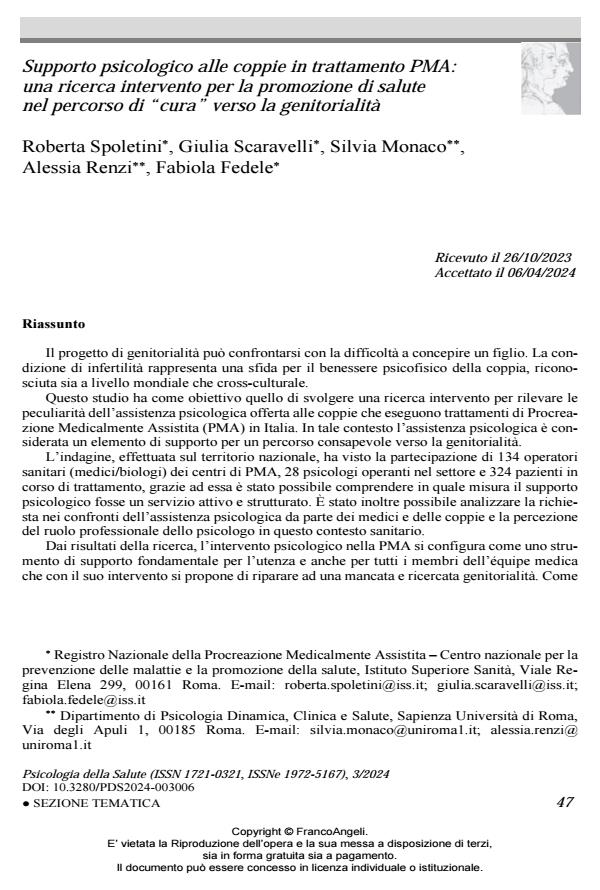Supporto psicologico alle coppie in trattamento PMA: una ricerca intervento per la promozione di salute nel percorso di “cura” verso la genitorialità
Titolo Rivista PSICOLOGIA DELLA SALUTE
Autori/Curatori Roberta Spoletini, Giulia Scaravelli, Silvia Monaco, Alessia Renzi, Fabiola Fedele
Anno di pubblicazione 2024 Fascicolo 2024/3
Lingua Italiano Numero pagine 15 P. 47-71 Dimensione file 234 KB
DOI 10.3280/PDS2024-003006
Il DOI è il codice a barre della proprietà intellettuale: per saperne di più
clicca qui
Qui sotto puoi vedere in anteprima la prima pagina di questo articolo.
Se questo articolo ti interessa, lo puoi acquistare (e scaricare in formato pdf) seguendo le facili indicazioni per acquistare il download credit. Acquista Download Credits per scaricare questo Articolo in formato PDF

FrancoAngeli è membro della Publishers International Linking Association, Inc (PILA), associazione indipendente e non profit per facilitare (attraverso i servizi tecnologici implementati da CrossRef.org) l’accesso degli studiosi ai contenuti digitali nelle pubblicazioni professionali e scientifiche.
Il progetto di genitorialità può confrontarsi con la difficoltà a concepire un figlio. La condi-zione di infertilità rappresenta una sfida per il benessere psicofisico della coppia, riconosciuta sia a livello mondiale che cross-culturale. Questo studio ha come obiettivo quello di svolgere una ricerca intervento per rilevare le peculiarità dell’assistenza psicologica offerta alle coppie che eseguono trattamenti di Procrea-zione Medicalmente Assistita (PMA) in Italia. In tale contesto l’assistenza psicologica è consi-derata un elemento di supporto per un percorso consapevole verso la genitorialità. L’indagine, effettuata sul territorio nazionale, ha visto la partecipazione di 134 operatori sanitari (medici/biologi) dei centri di PMA, 28 psicologi operanti nel settore e 324 pazienti in corso di trattamento, grazie ad essa è stato possibile comprendere in quale misura il supporto psicologico fosse un servizio attivo e strutturato. È stato inoltre possibile analizzare la richiesta nei confronti dell’assistenza psicologica da parte dei medici e delle coppie e la percezione del ruolo professionale dello psicologo in questo contesto sanitario. Dai risultati della ricerca, l’intervento psicologico nella PMA si configura come uno stru-mento di supporto fondamentale per l’utenza e anche per tutti i membri dell’équipe medica che con il suo intervento si propone di riparare ad una mancata e ricercata genitorialità. Come emerge dall’indagine la PMA necessita di uno spazio offerto dalla psicologia che renda possi-bile l’esplorazione dei vissuti e delle risorse di ogni protagonista del percorso di cura, con spe-cifica attenzione al rapporto di coppia. In quest’ottica l’assistenza psicologica, sia rivolta alle coppie in trattamento PMA che, co-me strumento di supporto per l’attività dell’equipe, può assumere una fondamentale funzione di accompagnamento nel sostenere il processo di cura. Da qui l’orientamento alla formulazione di buone pratiche di intervento psicologico per la costruzione di un modello di assistenza con-diviso, adatto alle caratteristiche dell’utenza e alla multidisciplinarietà del contesto sanitario, al fine di promuovere il benessere dell’individuo, della coppia e degli operatori.
Parole chiave:Supporto psicologico, infertilità, procreazione medicalmente assistita, promo-zione della salute, genitorialità
Roberta Spoletini, Giulia Scaravelli, Silvia Monaco, Alessia Renzi, Fabiola Fedele, Supporto psicologico alle coppie in trattamento PMA: una ricerca intervento per la promozione di salute nel percorso di “cura” verso la genitorialità in "PSICOLOGIA DELLA SALUTE" 3/2024, pp 47-71, DOI: 10.3280/PDS2024-003006